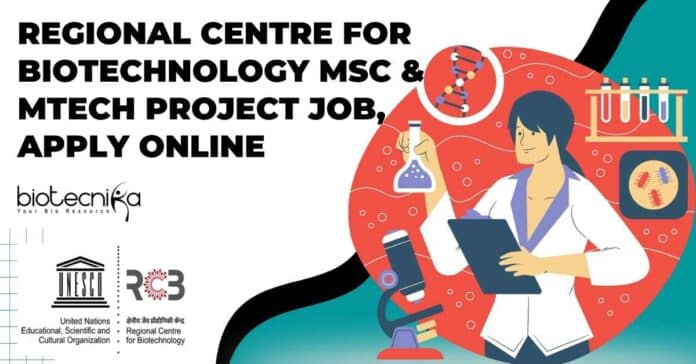RCB MSc & MTech Life Sciences Project Job Opening – Apply Online
RCB MSc & MTech Life Sciences Project Job Opening – Apply Online. MSc & MTech Life Sciences / Biotechnology / Agricultural Biotechnology project opening. Interested and eligible applicants can check out all of the details on the same below –
Hey, we have some help that you can find at the bottom of the page. Curious about how to prepare for this job interview? then check below
This job expires in
Advt. No. 12/Project/2023/HR
Interview for Project Associate-I position
Name of the Post – Project Associate-I
No. of Posts – One
Title of Project – An integrated molecular genomic approach to unveil genomic and epigenomic complexity of adaptive traits, like flowering time, seed size and plant cell wall.
Name of the Principal Investigator: Dr. Prashant Mohan Pawar, Assistant Professor
Name of the Co-Principal Investigator: Dr. Shouvik Das, MK Bhan Fellow
Duration – One year.
Age Limit: Below 28 Years
How to Apply –
Interested candidates should apply online by 3rd May 2023, 5:00 PM
The shortlisted candidates will be informed by 6th May 2023 via email to appear in the online interview to be held at 10:00 AM on 9th May 2023.
For any query, you may contact me by email: [email protected].
Please upload your academic certificate along with the application form
Regional Centre for Biotechnology,
3rd Milestone, Faridabad-Gurgaon Expressway
NCR Biotech Science Cluster, Faridabad,
Faridabad – 121001, (Haryana).
Ph – 0129-2848800.
Emoluments – Rs. 31,000/- + 24% HRA per month
Essential Qualifications – MSc/MTech in Life Sciences / Biotechnology / Agricultural Biotechnology, Any national level examination or eligibility test such as NET, GATE, etc. qualified.
Desirable Qualifications – Practical knowledge of molecular biology, and biochemistry techniques are necessary. A candidate who has a minimum of 1 year research experience of working on plant systems will be preferred. Candidate should be hardworking and a team player with interpersonal skills.
Check the notification below
INTERVIEW QUESTIONS FOR THE REGIONAL CENTRE FOR BIOTECHNOLOGY Project Associate Job
👍We hope this helps in giving you a rough idea as to how to prepare for the interview for this specific role. Good luck!
- Can you describe your experience working with molecular biology techniques and how you have applied them in your previous research projects? Answer: I have experience with various molecular biology techniques such as PCR, DNA sequencing, cloning, and gene expression analysis. In my previous research projects, I have used these techniques to investigate various biological phenomena such as gene regulation, protein expression, and signal transduction pathways.
- What is your understanding of epigenomics and its importance in understanding adaptive traits in plants? Answer: Epigenomics is the study of changes in gene expression that do not involve changes to the underlying DNA sequence. It is important for understanding adaptive traits in plants because it can reveal how changes in gene expression can lead to changes in plant phenotypes such as flowering time, seed size, and cell wall composition.
- How would you design an experiment to study the role of a specific gene in the regulation of flowering time in plants? Answer: I would start by identifying the gene of interest and generating a mutant plant that lacks that gene. Then, I would compare the flowering time of the mutant plant with the wild type plant to determine the effect of the gene on flowering time. Additionally, I would investigate the molecular mechanism by which the gene regulates flowering time by analyzing gene expression patterns and protein interactions.
- Can you explain your experience with bioinformatics tools and how you have used them in your previous research projects? Answer: I have experience with various bioinformatics tools such as BLAST, ClustalW, and Phylogenetic analysis. In my previous research projects, I have used these tools to analyze DNA and protein sequences, predict protein structures, and compare gene expression patterns across different species.
- How would you approach troubleshooting a technical problem in the lab? Answer: First, I would try to identify the source of the problem by checking the experimental conditions, reagents, and equipment used. Then, I would systematically test different solutions to see if they resolve the problem. If the problem persists, I would consult with other lab members or seek advice from external resources such as scientific literature or technical support from the manufacturer.
Editor’s Note – RCB MSc & MTech Life Sciences Project Job Opening – Apply Online. Please ensure that you are subscribed to the Biotecnika Times Newsletter and our YouTube channel to be notified of all of the latest in the industry. Follow us on our social media like Twitter, Telegram, Facebook and Instagram.




































